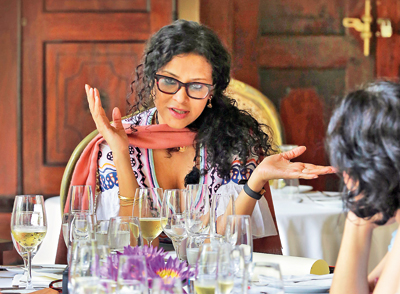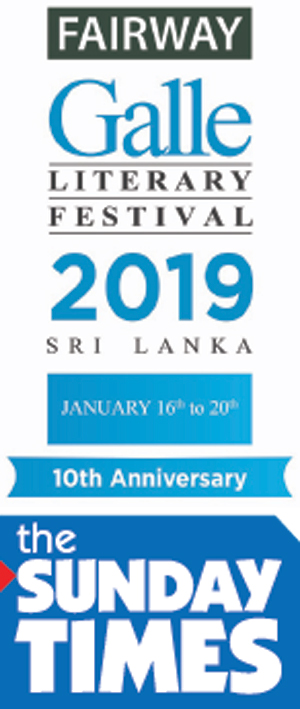Juggling many worlds

Nandana Sen: In animated conversation at the literary lunch. Pix by Sameera Weerasekera
Literary lunches held in swanky boutique hotels are a common part of the Fairway Galle Literary Festival programme, often featuring one or two notable authors. They’re akin to those dinner parties where you sit around a table and make polite small talk with the person next to you (someone you barely know), the only thing you have in common being your host/hostess. It’s awkward. Thankfully our high-spirited ‘hostess’ Nandana Sen knows how to expertly guide things along as she weaves in and out of conversation about her life and work.
An actress, writer and children’s rights activist, Sen comes from a family of artistic individuals and academics. Her grandmother – a poet – was one of the first widows to re-marry once it became legal in India and upon this happening, her close friend Rabindranath Tagore said, “You have recreated yourself. Today you are a new born person I give you this name – Nabanita (newly brought).”
“To which my grandmother, being as intransigent as ever,” relates Sen, “said ‘thank you, beautiful name but I already have a name. I don’t want to change it, I will save it – if I have a daughter she will have that name’.” And true enough Sen’s mother is of one of Bengali literature’s most prominent writers, Nabanita Dev Sen and her father is Nobel Laureate and economist, Amartya Sen. Nandana is no less accomplished, a sort of polymath in our midst. Having received several prizes for topping her class at Harvard University where she studied literature, she studied film producing at USC Film School before moving to the Lee Strasberg Institute for acting and even did a stint at the Royal Academy of Dramatic Arts in London.
She’s also kind of a big deal in India as her acting has gained her widespread recognition, but instead of devolving into the Bollywood rat race, she chose jobs based on the social impact they would make– “I’ve done eccentric independent films all over the world which have all had strong social or political content. I’ve done a film that’s on Islamaphobia and the rise of terrorism called ‘The War Within’ which was set in New York. I’ve done a film on apartheid and gay rights set in South Africa in the 1950s. My very first film was ‘Black’ about children’s disabilities.”
It’s hardly surprising then that she aspires to make a difference outside of the film industry. A prominent child rights activist, she is ambassador to many Indian organisations- “I travel frequently to Calcutta and Delhi to work with organisations like Operation Smile which works with children with cleft palates. I work with RAHI which is the first organization in India to work with survivors of child sex abuse and we just started up a chapter in Calcutta.” But just then, we are interrupted by a child seated in a high chair, right next to Sen. Meghla Devsen Makinson, Sen’s 4-year old daughter with John Makinson (who is sitting a couple of seats away),makes her presence known, pawing at her copy of her mother’s book, ‘Mambi and the Forest Fire’.
Sen chuckles and says, “It’s good to be parents to your biggest fan!”
One of five books she’s written for children, Sen explains how Mambi was born out of her activism work – “It came out of a workshop I was doing with children and women who had been rescued from trafficking in a home just outside Calcutta who are in the process of being rehabilitated. This particular group of children were initially very, very shy as they had just been put together quite recently so to break the ice I created the character of this shy monkey called Mambi who believed all the other children were better than her at doing things. And once this character was created all the children jumped in and created all the other characters and that’s what became this book.”
Apart from her normal activism work, Sen usually does workshops in children’s homes and orphanages when one of her books is released. “My books for children deal with in some way or another, the notions of empathy, freedom, and equality so I use Mambi to talk about gender equality and religious freedom.” It is during one such visit to a home in Karuna, about ten months ago, that Meghla came into her life. “The kids are not there for adoption as their parents are either incarcerated, or hospitalized, or in rehab – the kids are in the care of the home. But this little girl,” she looks at Meghla, “who couldn’t read at all but was completely fascinated by the books….she climbed into my lap..and…”
 “Adopted you,” interjects Makinson.
“Adopted you,” interjects Makinson.
“Yes! Well, adopted us.”
Both Sen and Makinson shuttle between New York, London and India so I asked what the change was like for Meghla. Sen replied, “You’re very resilient as a young person and we’re very proud of her because she’s very confident and has strong opinions but she is very trusting. And very loving!”
Makinson continues, “In the early months there was a lot of displacement. We’re in India and the UK and USA and I think that was very tough on her. So we established in the summer that we had to settle down in one place in New York and establish a routine.”
It sounds as if Sen has a lot on her plate. Currently she is in the process of writing a book about the three generations of Bengali women based on her own family so I ask how she is at time management. She laughs and says, “I’m not amazing at time management.”
John adds, “She’s not good at sleeping!”
A guest asks, ‘How do you connect with all these activities? It seems like you’re based in one place but your activities take you all over the world?’
“Yes I’ve kind of lived most of my adult life in a partitioned way dividing it between India, America and England and also dividing it between writing, cinema, and child rights. The work takes me where it takes me - I have an extremely supportive husband who is also extremely busy, but whenever I need to disappear he takes excellent care of our daughter and without him I wouldn’t be able to do it or juggle everything.”
Sen was also on the jury of the DSC Prize and quite happy that six translated books made it to the longlist. “We really do need to pay much more attention to developing translation as a literary form to encourage and respect translations. We create spectacular literature but it doesn’t reach a wider audience because we don’t have translators who take on the project with the kind of creativity, vision and imagination that we find in translations that happen in other parts of the world.”
I imagine that the reason she also feels so strongly about this is because she translated and published a book of her mother’s poetry as a surprise for her birthday. ‘It was a very beautiful and intimate experience – almost like I was re-discovering, understanding large chunks of her life that I didn’t really know about or fully comprehend before and it helped me understand some of the reasons why the separation between my parents happened. It made me understand how intimate yet intricate and complicated her relationship with her mother was. It made me understand how much she relied on poetry as a coping mechanism.”
To wind up, Sen reads through some of her mother’s poems such as ‘Night of the Rape’ and ‘Acrobat’ and I am struck by how relevant it is to today. She uses poetry to talk abstractly about the differences of men and women walking alone at night, or the endless juggling act women have to go through to keep things afloat – “Play with the now right next to the then, she would make both dance, fist to fist, and she would glide so smooth, along the tightrope”.
And with that, Nandana Sen glances at the time and glides out of Galle Fort Hotel for her next session. Always negotiating that tightrope.


